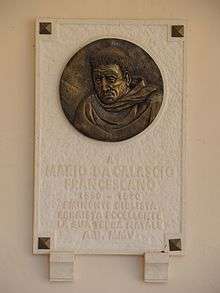Mario di Calasio
Mario di Calasio (1550 in Calascio, Abruzzi, Italy – February 1, 1620 in Ara Coeli) was an Italian Minorite friar.[1]
Biography

Joining the Franciscans at an early age, he devoted himself to Oriental languages and became an authority on Hebrew. Once entering Rome he was appointed by Paul V, whose confessor he was to the chair of Scripture at Ara Coeli. Calasio is known by his Concordantiae sacrorum Bibliorum hebraicorum, published in 4 vols. (Rome, 1622), two years after his death, a work which is based on Nathan's Hebrew Concordance (Venice, 1523).[2]
Works
For forty years Calasio labored on this work, and he secured the assistance of the greatest scholars of his age. The Concordance evinces great care and accuracy. All root-words are treated in alphabetical order and the whole Bible has been collated for every passage containing the word, so as to explain the original idea, which is illustrated from the cognate usages of the Chaldee, Syrian, Rabbinical Hebrew and Arabic. Calasio gives under each Hebrew word the literal Latin translation, and notes any existing differences from the Vulgate and Septuagint readings. An incomplete English translation of the work was published in London by Romaine in 1747. Calasio also wrote a Hebrew grammar, Canones generales linguae sanctatae (Rome, 1616), and the Dictionarium hebraicum (Rome, 1617).[2]
References
- ↑ MARIO da Calascio entry (Italian) in the Enciclopedia italiana
- 1 2 Chisholm 1911.
- Attribution
 This article incorporates text from a publication now in the public domain: Chisholm, Hugh, ed. (1911). "Calasio, Mario di". Encyclopædia Britannica. 4 (11th ed.). Cambridge University Press.
This article incorporates text from a publication now in the public domain: Chisholm, Hugh, ed. (1911). "Calasio, Mario di". Encyclopædia Britannica. 4 (11th ed.). Cambridge University Press.
External links
![]() Donovan, Stephen M. (1908). "Mario di Calasio". In Herbermann, Charles. Catholic Encyclopedia. 3. New York: Robert Appleton Company.
Donovan, Stephen M. (1908). "Mario di Calasio". In Herbermann, Charles. Catholic Encyclopedia. 3. New York: Robert Appleton Company.